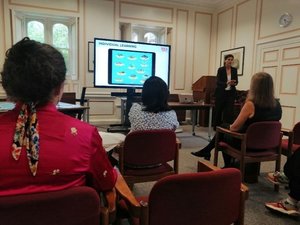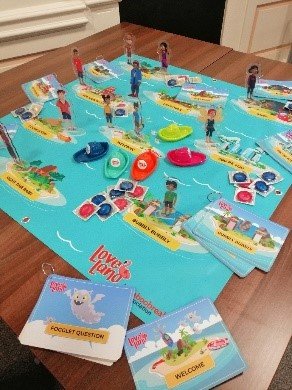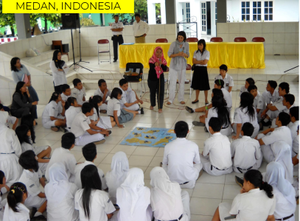Addressing the need for accessible sexuality information with a digital game app
Many of us working on the global prevention of HIV, sexually transmitted infections, unwanted pregnancies, sexual coercion and harm, and those concerned with protecting access to education, consider evidence-based information about sexuality and sexual and reproductive health to be critical in empowering young people to protect their health, flourishing and survival.

UNESCO, UNFPA, UNICEF, UN Women, UNAIDS and WHO, cognisant of the position of sexuality education within a framework of human rights and gender equality, developed evidence-based technical advice on effective comprehensive sexuality education (CSE) in the International technical guidance on sexuality education: an evidence-informed approach.*
CSE goes beyond biological facts to equip young people with the knowledge, skills, attitudes, and values to empower them to:
- realise their rights to health, well-being, and dignity;
- develop respectful social and sexual relationships;
- consider how their choices affect their own well-being and that of others;
- understand and ensure the protection of their rights throughout their lives.
The UN guidance recommends age-specific topics and learning objectives that need to be covered in comprehensive sexuality education. These guidelines, however, are not written to guide young people or parents directly, but to support education systems and national decision-makers to develop their own curricula and teacher training. As such, the implementation of sexuality guidance for adolescents and young people often becomes lost in the tide of national education and health priorities. The divisive nature of actively teaching sexuality information discourages leaders from launching much-needed initiatives during their time in office. In my working experience, including the global evaluation of CSE, the "comprehensive" nature of sexuality education is often missing from curricula, and the opportunity to roll out complete and inclusive preparation for adult life is greatly diluted.
As this theme is of interest to parents and carers of young people, as well as those concerned with equal health and human rights world-wide, the Women's Network invited Karin Stierlin, a South Africa-based Swiss sexual and reproductive health teaching and learning specialist, to present on her mixed-media innovation LoveLand, designed to enable young people in both rich and poor countries to directly access the information and learning recommended by the UN.

Frustrated by the lack of engaging materials for teachers to use with school children in Switzerland, Karin developed a board game as a teaching and learning tool. This was tested with children and teachers in different countries, but feedback from the young players indicated that they preferred digital game formats and teachers reported that they lacked guidance to support teaching this socially-sensitive theme. Karin's non-profit organisation, Taboobreaker Association, adapted by recruiting game developers to digitise LoveLand and adding an accompanying resource and learning website, including a teachers' manual and pack.

In her presentation, Karin illustrated the need for free, evidence-based digital tools and presented data on the access of young people to smart phones in resource-poor countries and the viability of global digital learning. She demonstrated the LoveLand game approach to interactive learning and communication with the board game and we were invited to peruse the Teacher Training Pack.
After the presentation, the discussion was very lively and rich, especially as some of the audience had adolescent children and so spoke from person experience. Our President shared her expert knowledge of predator behaviour and online tactics that will contribute to the evolution of safety mechanisms within Karin's digital approach.
LoveLand is still in development, which is constrained by the volunteer-driven nature of the innovation and very limited donor support. So far, a number of key topics have been developed within the app and the game is being tested and updated with South African children in townships surrounding Cape Town. Early research is being undertaken with the Psychology Department of the University of Cape Town (UCT) and a randomised controlled trial is planned for 2024 to determine the extent to which the LoveLand game supports learning and retention of knowledge.
My experience in global health has shown the field of sexual and reproductive health and rights to be a minefield of contention in many countries and as a result, there is a dearth of adolescent-focused learning innovations and accessible information based on UN guidance. But just because an issue is difficult does not mean that the world can afford to continue to ignore the practical needs and rights of adolescents and youth. This is especially pertinent as the consequences of confined sexual and reproductive health knowledge include vulnerability to manipulation by older predators, premature sexual debut, early and unwanted pregnancies (leading to exclusion from school and reduced economic opportunities), and life-changing sexually transmitted infections such as HIV and hepatitis C. These are just some of the reasons why I volunteer my professional skills to the organisation and the research at UCT.
You can access the slides of Karin's presentation LoveLand - an evidence-based program for the sexual and reproductive health of young people here.
Check for updates on the Women's Network Facebook Page